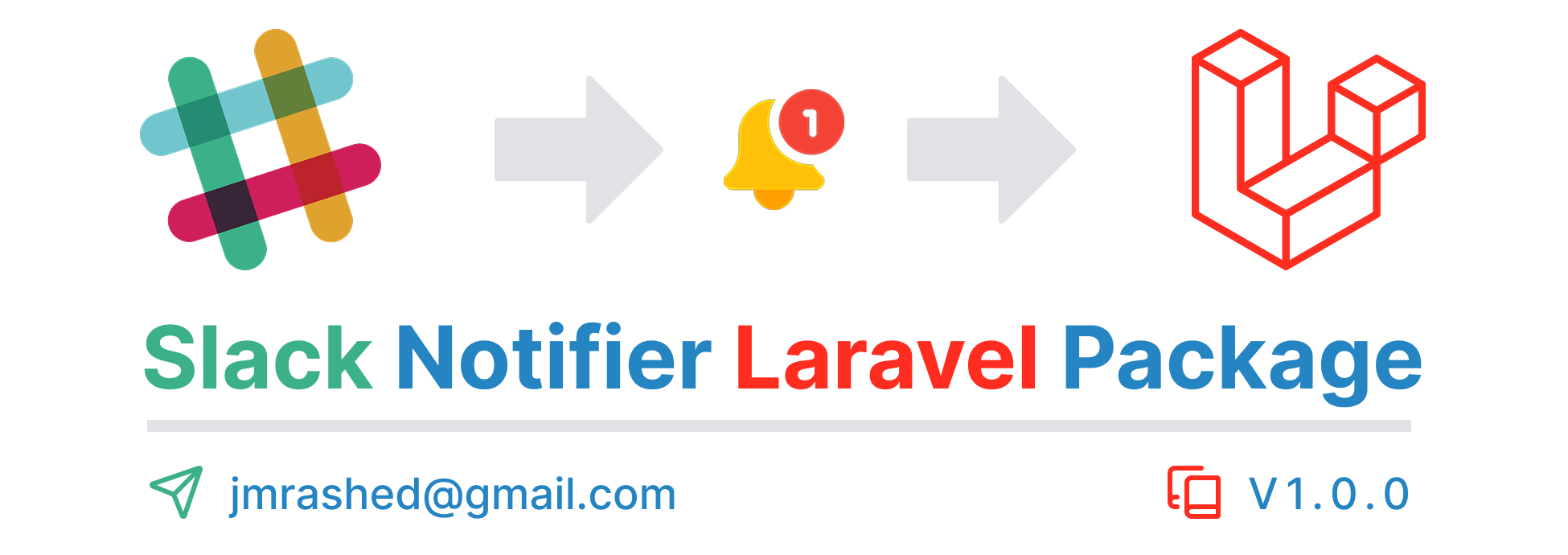A simple package to send notifications to Slack using webhooks, with support for customizations such as multiple webhooks, channels, bot name, emojis, and more.
To install the package, run the following composer command:
composer require jmrashed/laravel-slack-notifierOnce the package is installed, you need to set up the environment variables for the Slack webhook and other configuration options.
Add the following entries to your .env file:
APP_NAME=Laravel
LOG_SLACK_WEBHOOK_URL=https://hooks.slack.com/services/ABC
LOG_SLACK_CHANNEL=
LOG_SLACK_EMOJI=:boom:
LOG_SLACK_CACHE_SECONDS=0LOG_SLACK_WEBHOOK_URLis required and should be set to your Slack webhook URL. Learn how to create a webhook.- The other environment variables are optional. You can set
LOG_SLACK_CHANNELto specify a channel or useLOG_SLACK_EMOJIto set a custom emoji for the Slack messages.
To temporarily disable notifications, either comment out or set the LOG_SLACK_WEBHOOK_URL to an empty string or null.
Optionally, you can publish the config file with the following Artisan command:
php artisan vendor:publish --tag="slack-notifier"To send a message to Slack, use the following code:
use Jmrashed\SlackNotifier\Facades\SlackNotifier;
SlackNotifier::send('Test message');You can also send exceptions:
SlackNotifier::send(new \RuntimeException('Test exception'));To automatically report exceptions to Slack, configure your Laravel exception handler.
In bootstrap/app.php:
return Application::configure(basePath: dirname(__DIR__))
->withExceptions(function (Exceptions $exceptions) {
$exceptions->reportable(function (Throwable $e) {
\Jmrashed\SlackNotifier\Facades\SlackNotifier::send($e);
});
})->create();In app/Exceptions/Handler.php:
public function register(): void
{
$this->reportable(function (Throwable $e) {
\Jmrashed\SlackNotifier\Facades\SlackNotifier::send($e);
});
}In app/Exceptions/Handler.php:
public function report(Throwable $exception)
{
if ($this->shouldReport($exception)) {
\Jmrashed\SlackNotifier\Facades\SlackNotifier::send($exception);
}
parent::report($exception);
}In app/Exceptions/Handler.php:
public function report(Exception $exception)
{
if ($this->shouldReport($exception)) {
\Jmrashed\SlackNotifier\Facades\SlackNotifier::send($exception);
}
parent::report($exception);
}You can also send variables (strings, arrays, objects) to Slack:
use Jmrashed\SlackNotifier\Facades\SlackNotifier;
$variable = 'message'; // or $variable = ['key' => 'value'];
SlackNotifier::send($variable);You can configure multiple webhook URLs in the config/slack-notifier.php file:
// config/slack-notifier.php
'webhook_urls' => [
'default' => 'https://hooks.slack.com/services/ABC',
'testing' => 'https://hooks.slack.com/services/DEF',
],To use a specific webhook, specify the webhook name:
use Jmrashed\SlackNotifier\Facades\SlackNotifier;
SlackNotifier::to('testing')->send('Test message');To send a message to a different Slack channel, use the channel method:
use Jmrashed\SlackNotifier\Facades\SlackNotifier;
SlackNotifier::channel('reminders')->send('Test message');You can customize the bot’s name and emoji:
use Jmrashed\SlackNotifier\Facades\SlackNotifier;
SlackNotifier::username('My Laravel Bot')->emoji(':tada:')->send('Test message');If you need to format the message before sending, extend the default SlackNotifierFormatter class:
// config/slack-notifier.php
'formatter' => App\Formatters\CustomSlackNotifierFormatter::class,You can include additional context in the message. Use the context method to pass additional information as an attachment in the message.
Filter out unnecessary stack trace lines (e.g., from framework files) by configuring the dont_trace option in the config.
To avoid logging the same exception multiple times, use the LOG_SLACK_CACHE_SECONDS configuration. It defines how long exceptions will be cached before being logged again.
Alternatively, you can specify the cache duration programmatically:
use Jmrashed\SlackNotifier\Facades\SlackNotifier;
SlackNotifier::cacheSeconds(60)->send(new \RuntimeException('Test exception'));To run the tests for this package, use the following command:
composer testThis package is licensed under the MIT License. See the License File for more details.
